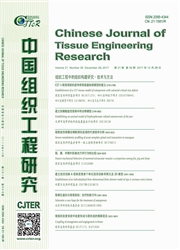

 中文摘要:
中文摘要:
背景:人β-防御素在皮肤的固有免疫中占据重要地位,同时由于其广谱的抗菌活性,从而成为抗感染临床研究中的热点。目的:观察原代培养人皮肤角质形成细胞在浓度梯度肿瘤坏死因子α的刺激下,其免疫分子β-防御素及Toll样受体的表达情况。方法:取8例30岁以下患者包皮组织,分别原代培养获取角质形成细胞,并采用浓度梯度肿瘤坏死因子α(10,50,100,150,200μg/L)进行刺激,实时荧光定量PCR检测β-防御素1,2,3及Toll样受体2,4的基因表达水平。结果与结论:肿瘤坏死因子α对β-防御素1,2,3基因表达均有明显诱导作用,且在150μg/L时达到最大效应(P〈0.05),相对于对照组分别出现明显的升高,而在200μg/L时又出现明显降低,呈现出浓度依赖性趋势。肿瘤坏死因子α诱导角质形成细胞后,Toll样受体2,4的表达规律类似于β-防御素。结果可见肿瘤坏死因子α对体外培养的皮肤角质形成细胞有显著的免疫诱导效应。
 英文摘要:
英文摘要:
BACKGROUND:Human β-defensin plays an important role in the innate immune of the skin.Because of its broad spectrum antibiotic activity,human β-defensin has become one of the hotspots in the clinical anti-inflammation research.OBJECTIVE:To show the inducible expression of human β-defensin and Toll-like receptor in human skin keratinocytes by graded concentrations of tumor necrosis factor alpha(TNF-α).METHODS:Healthy foreskin tissue samples were obtained from eight patients aged less than 30 years undergoing prepucectomy.Cultured primary human skin keratinocytes from the foreskin were stimulated with graded concentrations of TNF-α(10,50,100,150,and 200 μg/L).Real-time PCR was performed to quantify mRNA expression of β-defensin 1,2,3 and Toll-like receptor 2,4 from the stimulated cells.RESULTS AND CONCLUSION:Compared with the control group,the expressions of β-defensin 1,2,3 and Toll-like receptor 2,4 in keratinocytes induced by TNF-α were up-regulated apparently and the strongest inducible effect was at the concentration of 150 μg/L(P〈0.05) and down-regulated again at the concentration of 200 μg/L,presenting a dose-dependent manner.Skin keratinocytes showed a marked inductive capacity to produce human β-defensin 1,2,3 and Toll-like receptor 2,4 in response to TNF-α.
 同期刊论文项目
同期刊论文项目
 同项目期刊论文
同项目期刊论文
 The expression of hBDs in the gingival tissue and keratinocytes from healthy subjects and periodonti
The expression of hBDs in the gingival tissue and keratinocytes from healthy subjects and periodonti 期刊信息
期刊信息
